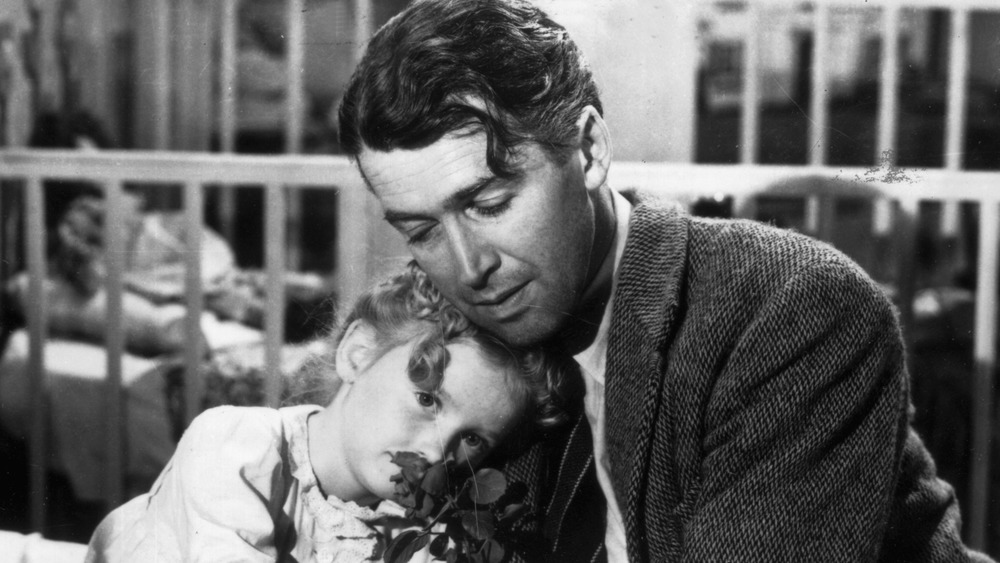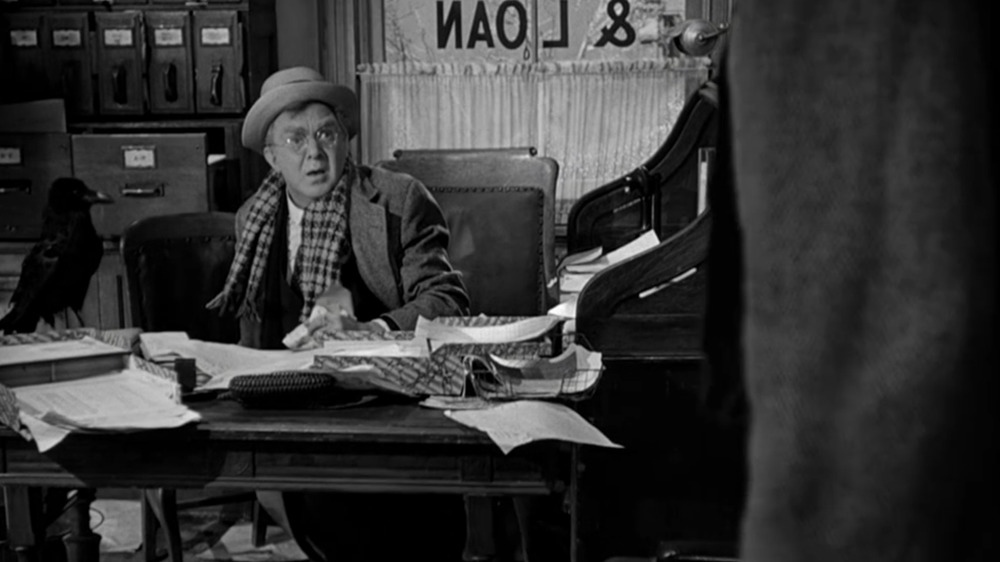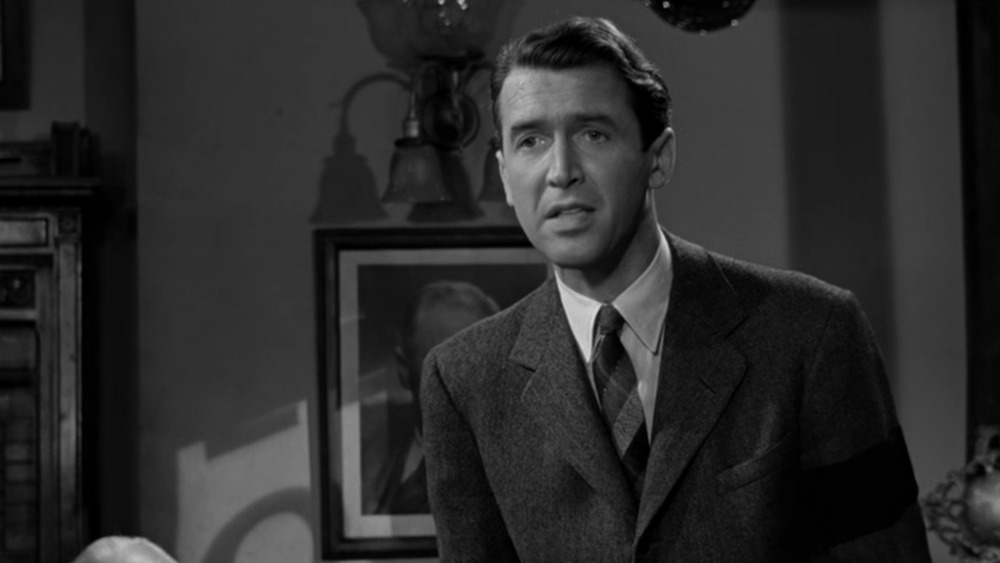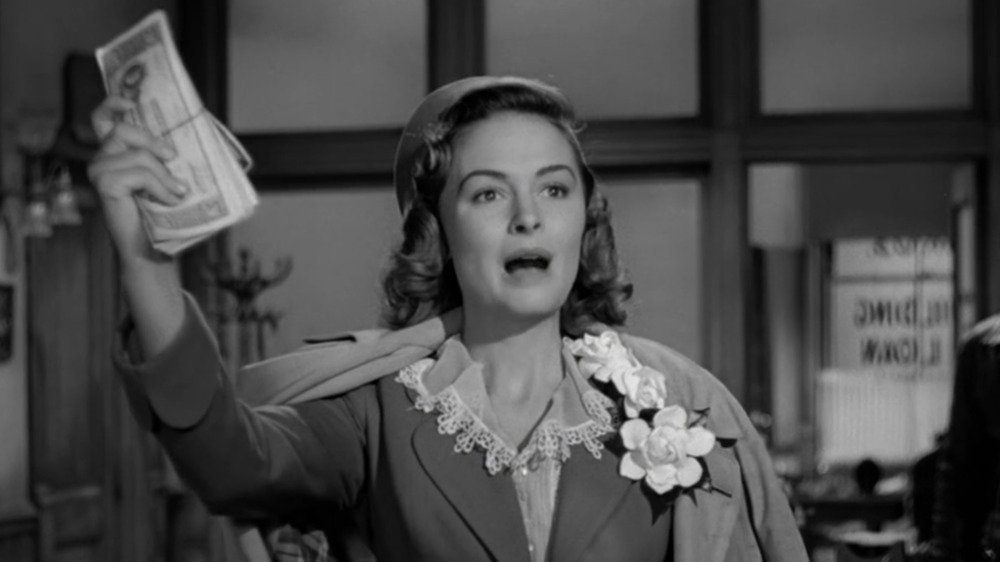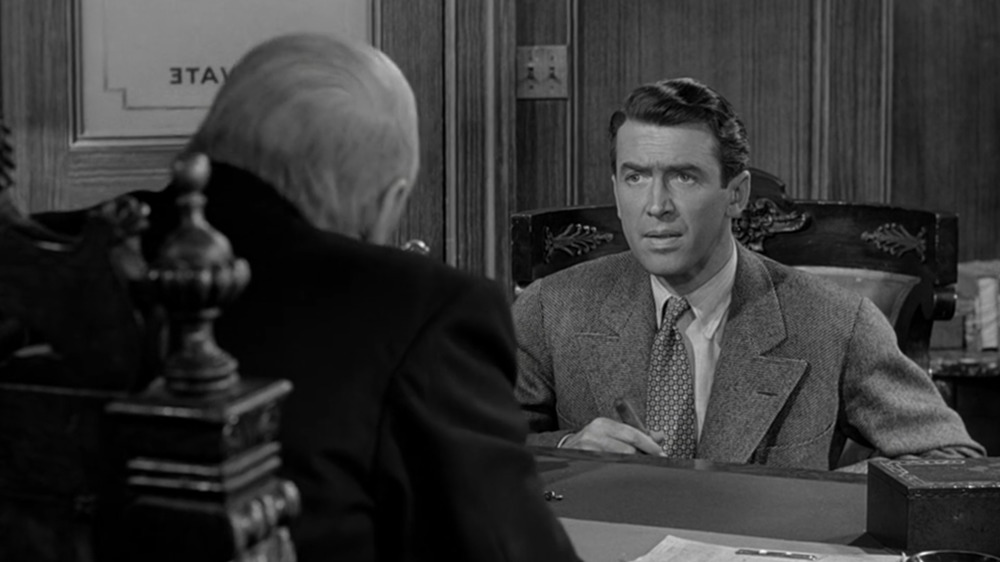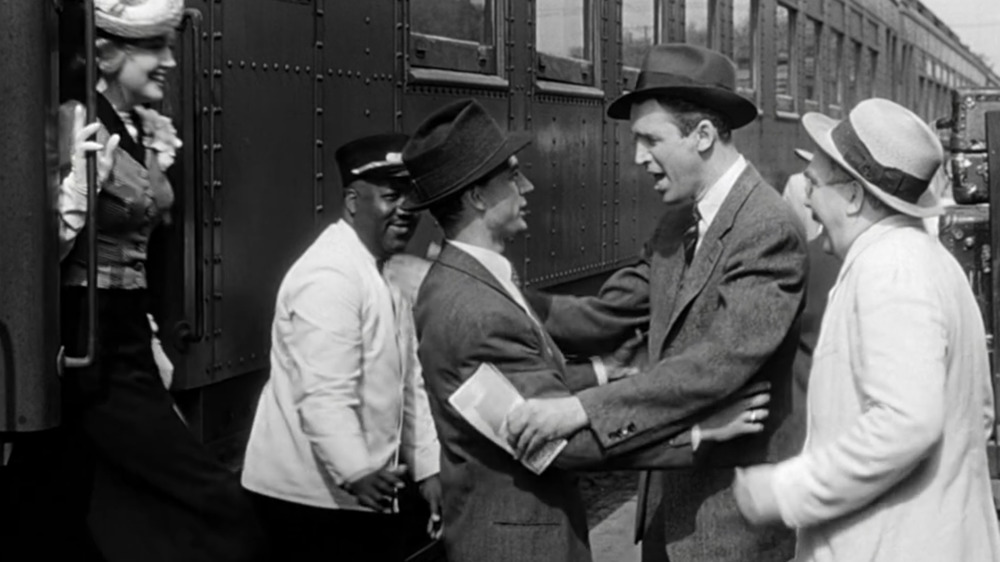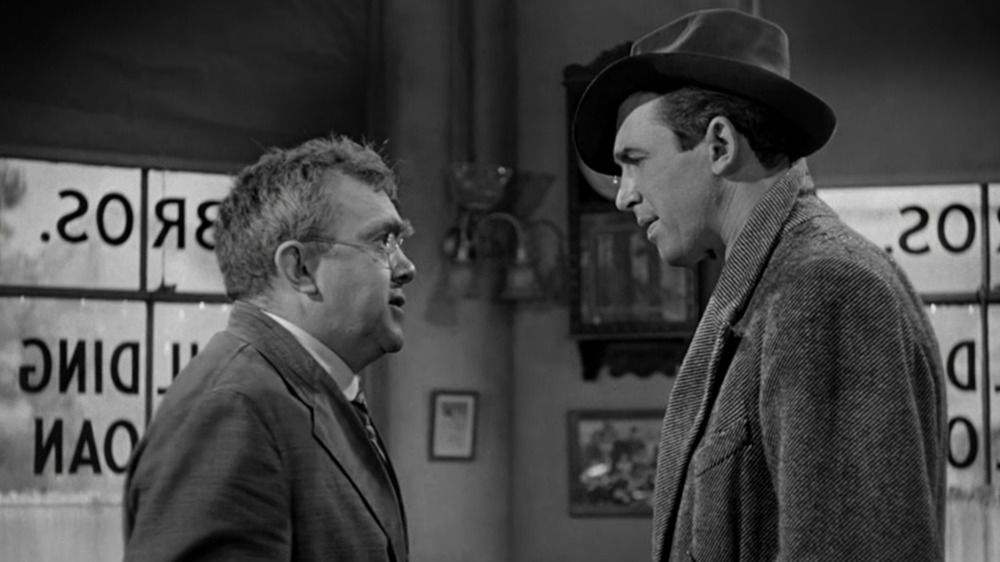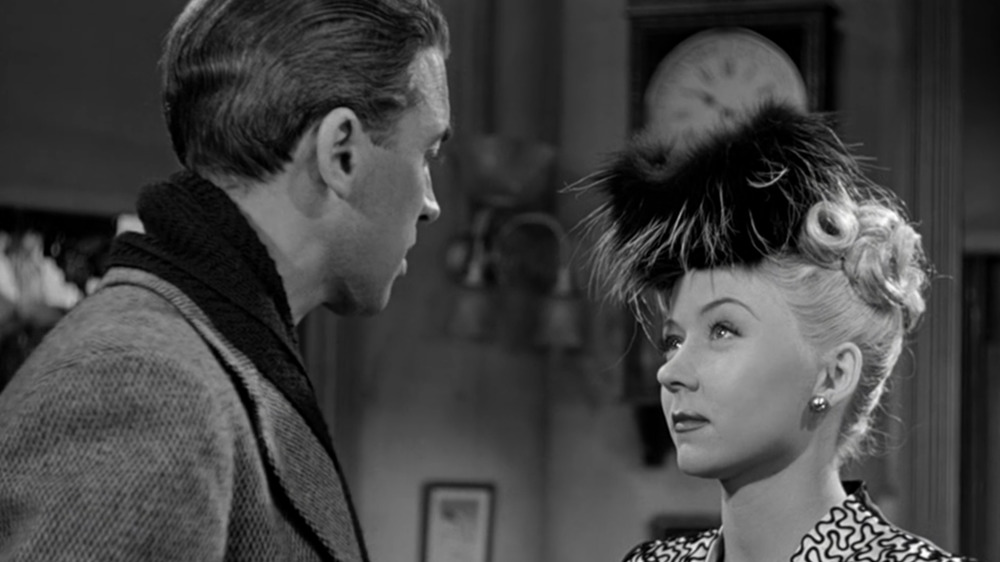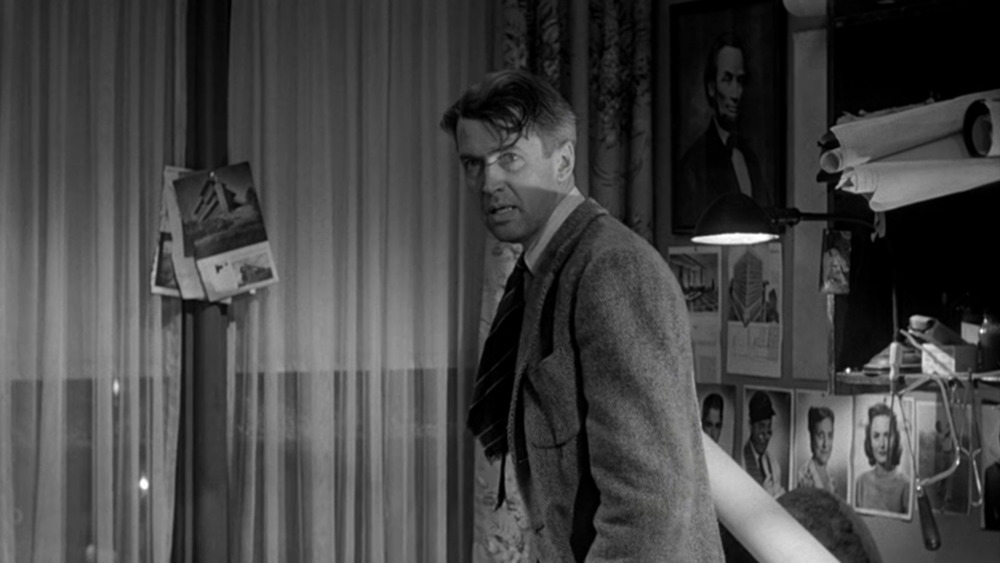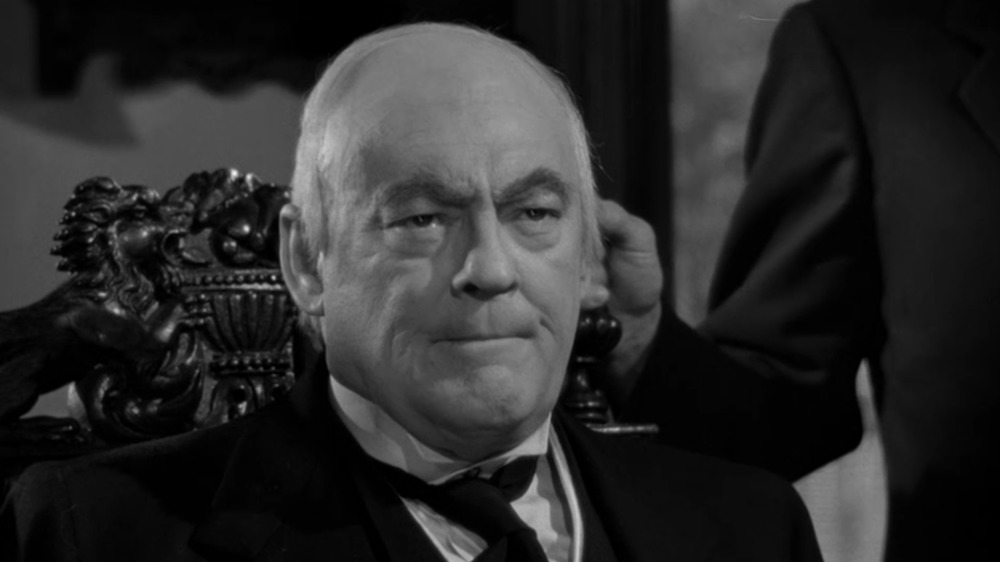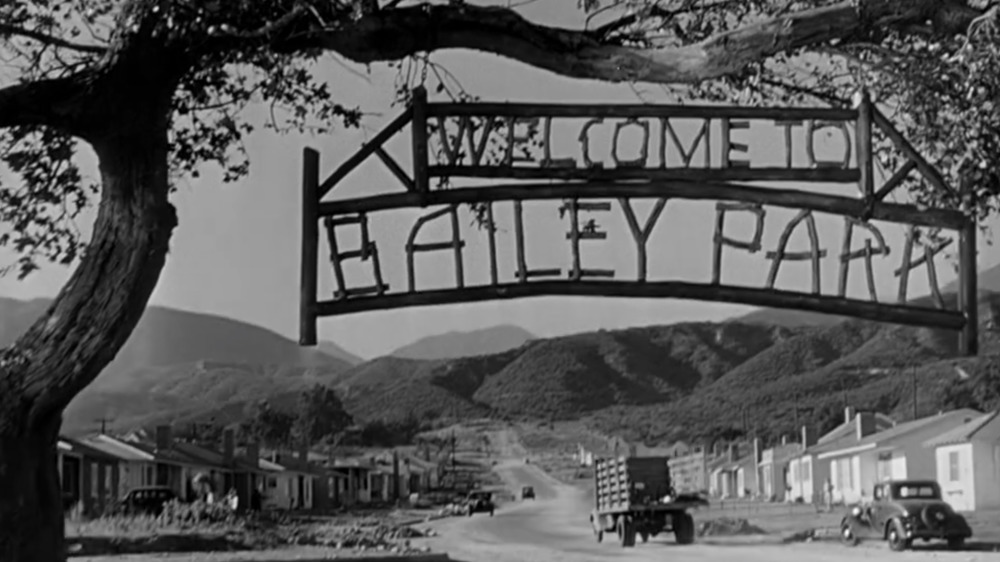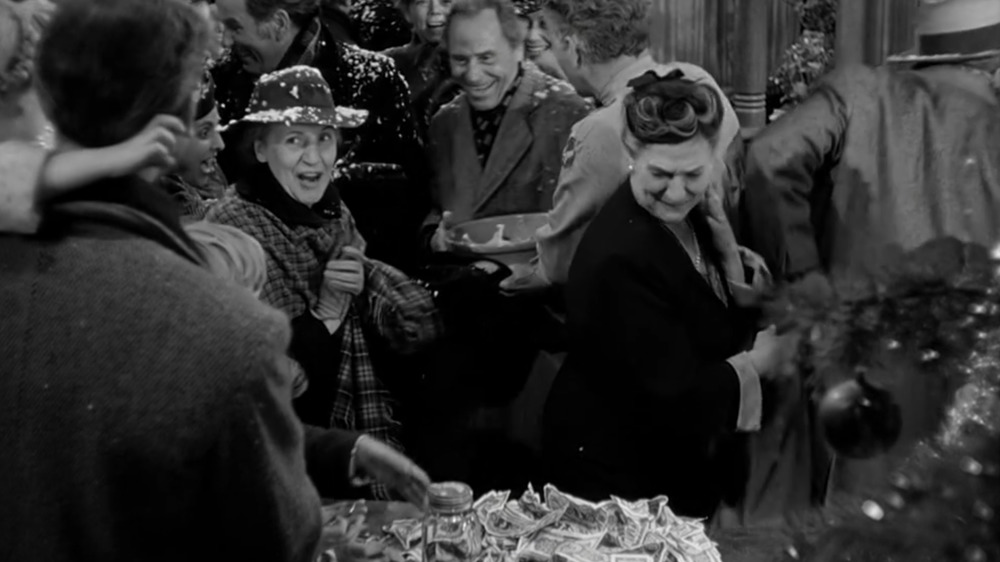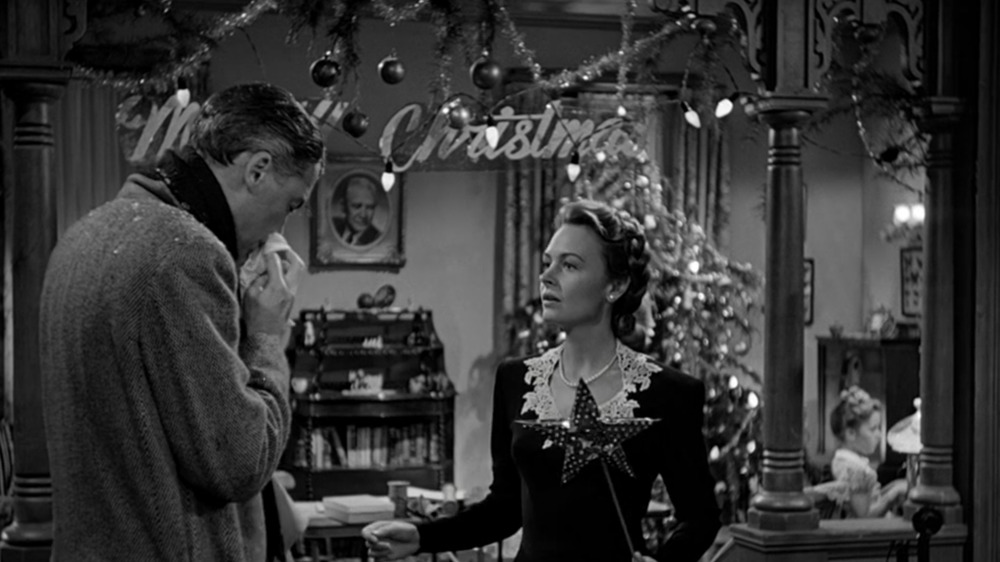Things Only Adults Notice In It's A Wonderful Life
It's a Wonderful Life is as classic a movie as they come. The film is continuously played throughout the holidays and holds relevance to this day. Despite the film's family-friendly nature, however, It's a Wonderful Life is seasoned with details that go over younger viewers' heads.
The film tells the story of George Bailey (James Stewart), a lovable man who has endured a lifetime's worth of heartbreak in just a few decades. George gives up on his moonshot dreams to help other people, and eventually, his troubles (and Uncle Billy's foolish mistake) lead to him considering suicide on Christmas Eve. This spurs the intervention of his guardian angel, Clarence Odbody (Henry Travers). Clarence takes George on a journey, showing him what he means to the community of Bedford Falls and how unfortunate people's lives would be if he'd never been born.
After spending time in George's world, it's hard not to look at life differently, even for the youngest among us. There are, however, certain elements of the film that go unnoticed by younger audience members. Get ready to embark on an adventure that ends at inspiration city, because we're here to reveal things only adults notice in It's a Wonderful Life.
What's up with the raven?
Pets are always adorable. Four-legged furry creatures are the norm, but as long as an animal isn't dangerous and is well-mannered, other kinds of pets can be embraced as well. It's a Wonderful Life subtly places a raven at George's family business, Bailey Brothers Building and Loan. The raven might not be a major character, but it sure is a memorable pet ... and also seems to breed some major bad luck.
In the raven's defense, it's well-trained and chills happily in the bank office, usually minding its own business. It's important to note, however, that three unfortunate events occur when the raven is present. First, George's father dies and he's forced to take over the business. Then there's a bank run and clients attempt to withdraw their money, leading to George and Mary Hatch Bailey (Donna Reed) using their honeymoon funds to keep the bank open. Finally, Uncle Billy carelessly loses $8,000, putting the business in dire financial straits and legal turmoil. The raven doesn't actually cause these occurrences — it is, after all, a bird — but since the glossy-feathered creature is around for every one of these situations, it can be viewed as a bad omen. Pretty dire symbolism for a Christmas movie — but that's why people love this unique film.
George's empathy leads to his downfall
When it comes to kind characters, George Bailey is at the top of the list. He constantly puts his dreams on hold to help others in need. George dreams of going on a world tour, but puts his trip on hold to look after the family business after his father passes away. George also wants to go to school to earn his degree, but he stays home to, yet again, look after the family business, as Mr. Potter (Lionel Barrymore) is threatening to dissolve the failing bank. George gives up his tuition so his brother Harry Bailey (Todd Karns) can attend college. Harry is supposed to run the business upon graduation, but he returns home married and with a job offer from his father-in-law, leaving George to run the bank. Most brutally, George and Mary end up having to use their honeymoon money to save the bank.
George faces these unfortunate events with kindness, but his empathy leads to suicidal misery. The bank — and George by extension — finally becomes a success by the end of the movie, but adult viewers won't soon forget how George's itch to help others brought him to his knees. Empathy is essential, but never putting one's self first can be destructive in a way only older people can truly grasp. George could have followed his own path at any point in the movie, but he kept giving and giving and giving, to the point of abject misery.
George is seen as the town's savior, but Mary is equally important
George might be the star of It's a Wonderful Life, but Mary is just as selfless and compassionate. After all, it is her idea to use the honeymoon money to keep Building and Loan solvent. She also doesn't get mad at George when he stops the car on the way to their honeymoon, so they can see what's going on at Building and Loan. It bears repeating: Mary doesn't complain about giving away their money (which they should, admittedly, eventually get back from the bank), or that their honeymoon is ruined. No, she instead surprises George by buying the Old Granville House that Mary had wished for years before. Really let that sink in for a moment. Mary buys George a house and makes the best out of a bad situation when everything she might have expected out of their marriage ends up vanishing.
Mary always supports George and his wishes, as well as raises their kids — no small task. George is, without a doubt, one of the most moral residents of Bedford Falls, but Mary isn't far behind, and is doing it while juggling children. Needless to say, they're a perfect match.
Mr. Potter's offer is actually extremely generous
Mr. Potter is the villain of It's a Wonderful Life. Therefore, everything he does can be viewed as a ploy to keep George from achieving his goals. Mr. Potter offers George a job so he can shut down Building and Loan, because he's threatened by George's long-coming success. This is indeed dastardly, but really, his offer is more than generous, in a way the grown-ups in the audience can't help but notice.
George only makes $40 a week. Mr. Potter offers him $20,000 a year, which is about $385 a week. To put that into context, $40 in 1945 is equivalent in purchasing power to about $577.47 in 2020, and $385 in 1945 is equivalent in purchasing power to about $5,558.15 in 2020. Today, George's salary would increase from $30,028.44 a year to $289,023.80 a year. That's a major increase, to say the least, and Mr. Potter really doesn't have to offer him that much money. The man is cruel, but he is very fair in this respect. George's finances would, at last, be in good standing if he took this offer. Of course, George turns him down, continues to bet on himself, and it all works out in the end. But seriously — that's one heck of an offer.
Harry does everything George dreamed of doing
George is a solid and loving older brother. Naturally, he sacrifices himself to save Harry as a child when Harry falls into a frozen lake — and George, tragically, loses hearing in one ear. Harry doesn't squander his life, and goes on to do everything George dreams of doing. Harry goes to college in a town that isn't Bedford Falls. He receives an excellent job offer from a company that isn't Building and Loan. Harry travels the world as he becomes a Navy pilot and fights in the war. To add insult to injury, Harry even earns the Medal of Honor, and the town prepares a hero's welcome for him upon his return on Christmas Eve.
George loves his brother deeply, and he takes over the family business so his younger sibling can have a life. But it's hard not to notice –especially for adults who ponder just how much they've given up in service of others — that Harry gets to do everything his older brother originally set out to do because said older brother gives those dreams up.
Uncle Billy is a terrible employee
There's a reason the board doesn't have Uncle Billy take over the family business. They decide to put George in charge instead, despite the fact that George is an unseasoned young adult. This choice is due to George's maturity, but also to Billy's total incompetence. Consider how Uncle Billy freezes up during the bank run, leaving George scrambling to figure out how the business can be saved. Worst of all, Uncle Billy inadvertently hands Mr. Potter, George's rival, $8,000 that belonged to Building and Loan, all but guaranteeing that someone will go to jail and the business will have to permanently shut its doors. If an angel hadn't come down from the heavens and assisted George, things would have been dire indeed.
Every situation is set up so George has to save the day, because that's how movies work. But it's hard for a more seasoned viewer not to notice how much of a screw-up Uncle Billy is. In fact, it's a wonder he continues to keep his job at all.
George gives his own money to Violet Bick without talking to his wife
George's kindness is admirable, but it takes a toll on his well-being — and sometimes, it's downright inappropriate. Consider the moment when George, a married man with kids, loans money to Violet Bick (Gloria Grahame), an attractive woman George and other men ogle throughout the movie. Violet has also had a thing for George since they were kids. George, at the very least, should talk to his wife before he gives away their money to other people. The kicker is the fact that George works at a bank that lends money. If the bank won't loan Violet money because of a presumably rocky credit history, then he probably shouldn't either! This is yet another careless thing George does to put others at ease, without worrying about the ramifications it'll have on himself, as well as his wife and kids. It puts his family at a financial disadvantage and also leads to rumors about Violet and George's relationship. That can't be fun for his family to endure.
Times are different now than they were in the '40s, but even then, most people wouldn't be happy if their partner gave money to an attractive individual who uses said attractiveness as a tool to get money in the first place — at least not without a discussion, at the very least.
George has a mental breakdown after pushing down years of trauma and heartache
Younger viewers might not grasp this, but George has a full on mental breakdown after the $8,000 goes missing at the bank. His breakdown isn't solely due to this one calamity, though. George's crisis is the result of years' worth of trauma and heartache.
In case you weren't keeping score, George loses his hearing, a life-changing event, in one ear at a young age. He loses his father to a stroke, which results in him not being able to go to college. He gives up his dreams of traveling the world to keep the family business running. He sacrifices his dreams yet again so his younger brother can live the life he always wanted. His friendly rival, Sam Wainwright (Frank Albertson), offers to get him in on the ground floor of his company. George declines and the get-rich-quick scheme actually does end up making Sam rich.
Years of anger, disappointment, and sorrow have been buried deep down, until George finally can't take it anymore. He does apologize to his family before leaving the house after a brief outburst, but he considers suicide because he believes he's worth more dead than alive, as a result of his life insurance policy. He realizes the gravity of his misfortunes all at once, and feels he can no longer take it. Luckily, George's guardian angel helps him — but if hadn't, things would have been bleak.
Mr. Potter might be the worst, but his business reasoning checks out
Mr. Potter is a bona fide miser who's no stranger to taking advantage of people to build his empire. But for all his villainy, his business acumen can't be denied. While it's wrong to take advantage of people during a time of need, something that makes Mr. Potter rich, he's not wrong for not wanting to loan untrustworthy people money. A person of any status typically shouldn't loan money to someone who can't pay it back. This is very true if they're trying to run a business with that money ... especially if that business is a bank. If loans were given to every single customer, a bank would lose all its money.
Mr. Potter also isn't wrong for not wanting to lend George money. For one thing, if George's business goes under (AKA Mr. Potter's competition), then Mr. Potter will control Bedford Falls — it's brutal, but it's the truth, and Mr. Potter would be a fool to ignore it. Moreover, George doesn't have the assets to cover a possible loan from Mr. Potter. Then there is the fact that George's financial woes would have dissolved (albeit along with his business) if he accepted Mr. Potter's generous and life-changing job offer. It's hard not to see where Mr. Potter is coming from, especially when he makes a point of not stiffing George when he's in a rough position.
George actually achieves a lot
As the saying goes, the grass is always greener on the other side of the fence. George considers himself a failure because he feels responsible for the missing $8,000. He also realizes, in the depths of his breakdown, that he's never achieved his dreams of traveling the world and building things. That's not at all true, however. A more seasoned viewer can see that George has actually achieved and built a lot in his years on Earth.
Not only does George help build a beautiful family, he plays a big role in creating Bailey Park, a modern housing development that rivals Potter's overpriced slums. George also helps build a community. Without the assistance of George, Bedford Falls would have been taken over by the greedy Mr. Potter, and George's family and friends' lives would have been all the worse. By the end of the movie, George becomes "the richest man in town," both financially and in terms of his relationships. But he always was — he just needed a little perspective, of the sort adults have, to see it.
The townspeople's donations don't make up for the fact that the bank's money is still missing
In the end, Bedford Falls comes up big for George, his family, Uncle Billy, and the Building and Loan business. The townspeople donate enough money to make up the missing $8,000, and Sam even gifts George a $25,000 credit line.
The initial $8,000, however, is still missing. And because George goes to Mr. Potter begging for money before the donations, the authorities are aware of the misfortune. Moreover, although the bank now has more than $8,000, the missing money is still other people's money. That has embezzlement, at least in the eyes of the law, written all over it. George is a good person, so the warrant for his arrest is ripped up and discarded, but that $8,000 belonged to the people who bank at Building and Loan, and Mr. Potter somehow gets away with keeping the cash. $8,000 might not sound like enough for a prison sentence, but it still went missing, and that total has the same purchasing power of about $115,493.93 in 2020.
It's a Wonderful Life is hardly a Christmas movie
It's a Wonderful Life isn't remotely a Christmas movie until after George comes back to the present day and the original timeline is restored. Of course, the audience is aware that it's Christmas Eve, and there are Christmas decorations in George and Mary's house. But the film is primarily a biography of George's life, so his guardian angel can better understand why he's worth saving. Thus, most of the movie doesn't take place during Christmas time — it just so happens to start and end on Christmas Eve. This isn't a knock on the film: It's a realization that's easy to miss, and hey, if Die Hard is a Christmas movie, It's a Wonderful Life certainly counts too. But it should be noted that It's a Wonderful Life is considered a Christmas movie despite lacking many traditional holiday elements, which is especially obvious when it's compared to classics like Elf or How the Grinch Stole Christmas.
In the end, none of these inconsistencies matter all that much. The townspeople save the day, the bank's embezzlement issue is swept under the rug, the movie ends with the main characters living happily ever after. It's a Wonderful Life might land differently for kids and adults, but all viewers are united in appreciating its kind-hearted moral.
